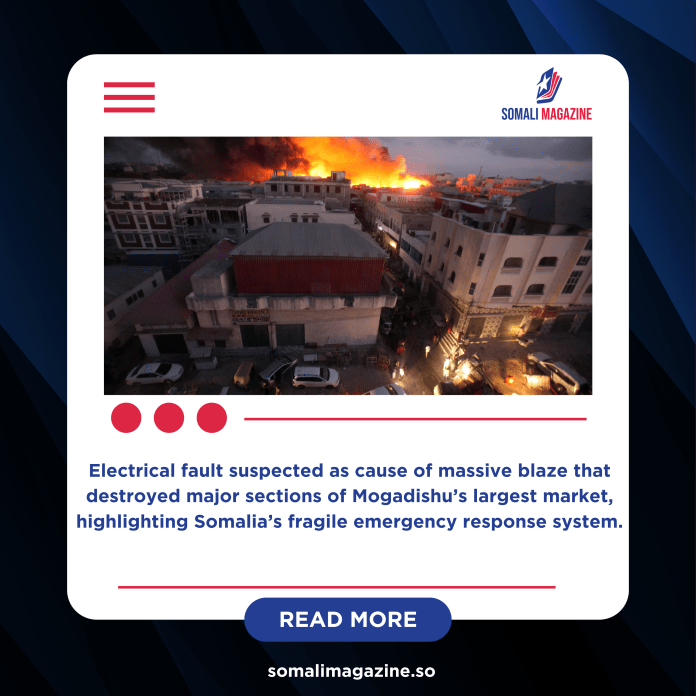Facebook Twitter (X) Instagram Somali Magazine - People's Magazine
A huge fire broke out at Suuq Bacaad, one of Mogadishu’s busiest markets, on Monday night, causing massive destruction and claiming the life of a young girl.
The fire, which started late in the evening, quickly spread across several sections of the market. Authorities believe it was caused by an electrical fault. Yaaqshiid District Commissioner, Suleyman Mahmoud Fargax, visited the scene and expressed his condolences to the family of the young victim. He confirmed that, aside from the girl, there were no other casualties.
Eyewitnesses described the scene as chaotic, with thick smoke filling the air and traders desperately trying to save their goods. Among those affected was Ibrahim Muse, a local trader, who lost three of his shops in the fire. He said shops owned by his mother were also destroyed.
“Tonight, we have become a destitute family,” Ibrahim said emotionally. “Everything we worked for is gone. We are deeply saddened.”
The fire raged for several hours before it was finally brought under control. Firefighters from the local government, emergency crews from Hormuud Telecom, and other volunteers worked together to contain the blaze. Despite their efforts, large portions of the market were left in ruins.

Suuq Bacaad is one of the largest open-air markets in the capital, and it serves as a key business center for thousands of traders. The loss of goods and shops has left many families without their primary source of income.
On Tuesday, traders are expected to form a committee to assess the full extent of the damage. The committee will also help coordinate the next steps for the affected shop owners and explore ways to support those who lost their livelihoods.
This tragic incident has again highlighted Somalia’s weak emergency response system. Due to decades of conflict, underfunded public services, and poor infrastructure, the country struggles to handle disasters like major fires. In many cases, markets and neighborhoods are left to rely on private companies and volunteers during emergencies.
Community members are now calling for stronger safety measures in public spaces. Many believe that regular inspections of electrical systems and better fire preparedness could help prevent future tragedies. There are also growing calls for more investment in public safety, including better-equipped fire departments and quicker emergency response units.
For now, affected families and traders are trying to come to terms with their losses. Some are hopeful that the government and humanitarian organizations will step in with support to help them rebuild their businesses and recover from the shock.
While the flames have been put out, the scars left by the fire—both physical and emotional—will take much longer to heal.

